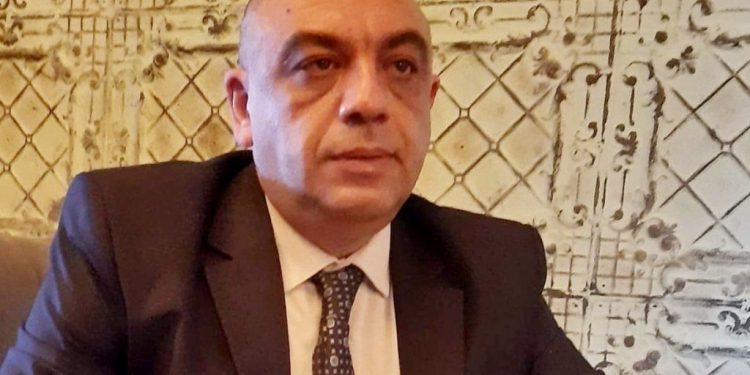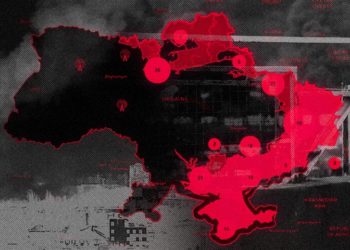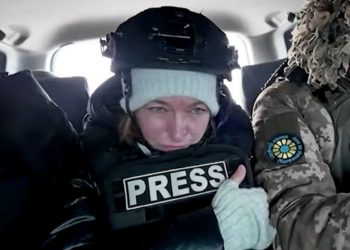The war waged by Russia against us has been going on for over a year. During this period, Ukraine received various aid from many countries. At the same time, even among our neighbors, there are those who support Russian aggression in Ukraine. There are many reasons to side with the enemy – historical memory, economic interest… The influence of the Kremlin-financed media worldwide cannot be underestimated either. In addition, a foreign state may be involved in another conflict.
What is the role of mass media in shaping public opinion about our war abroad? Is the world tired of the Russian-Ukrainian war? What does interest in the war depend on? We asked Emil Guliyev, the editor-in-chief of the Azerbaijani Vesti az, all these questions and more.
– How often does the topic of the war in Ukraine appear in the Azerbaijani mass media?
– With the beginning of the war in Ukraine, especially the first two or three months, Ukraine’s agenda was the main topic of the Azerbaijani mass media. But no matter how cynical it sounds, the war continues. News about it is no longer in the first place, but the Ukrainian agenda is still one of the main ones in both Russian- and Azerbaijani-speaking media.
– Where is the war in Ukraine mentioned more often – television, Internet resources, social media networks?
– If you take Azerbaijan’s leading mass media, it is the same everywhere. However, TV channels have a time limit, unlike sites where you can publish news as much as you want. But the most important news about the war is necessarily present on television.
– Are there pro-Russian mass media in Azerbaijan?
– There are Russian projects, such as Sputnik Azerbaijan. However, I don’t think there are frankly pro-Russian ones.
– Do Russian fakes penetrate your media?
– I can only say about serious mass media, which are targeted, whose news is discussed on social networks. We ourselves are part of the media group. To avoid succumbing to fakes, which are commonplace during the war, from the first day, we set ourselves the task of referring only to statements or messages of officials of both Russia and Ukraine.
– Do the mass media create an artificial balance of the points of view of the warring parties?
– No, we mainly refer to official sources. The war is in the territory of Ukraine, so there is more news from the Ukrainian side than from Russia’s. For example, Russia shelled Kharkiv. How to balance the news with information from the Russian side? There is no such possibility. But it happens that we give different positions from the same event. For example, when the Russian side announced that Bakhmut was taken several times entirely, we wrote something like this: “Ukraine and Russia report conflicting information about the situation in Bakhmut.” In this case, we published both messages: Russia says they took Bakhmut, and Ukraine says Bakhmut is still being defended.
– How does your media explain the essence of the Russian-Ukrainian military conflict?
– For Azerbaijan, the occupation is not something amorphous. We survived the occupation for 30 years and perfectly understand the Ukrainian side, which defends its territories. (Azerbaijan, after a 30-year war, recaptured Nagorno-Karabakh from Armenia in 2020. However, military clashes still occur periodically – ed.). The absolute majority of both society and journalists understand that Ukraine is defending itself, not attacking, which is the case for Azerbaijan. Based on this, the attitude towards this war is formed. Ukraine is the victim because its cities are exposed to rocket fire, and Russian troops occupy part of the territory of the east. This is reflected in the official position of Azerbaijan, which since 2014, since the annexation of Crimea, has unequivocally declared the recognition of the territorial integrity of Ukraine, which means: Crimea is Ukraine’s part.
– How do your mass media see the war’s end in Ukraine?
– In my opinion, the war cannot end diplomatically under the current situation. As our experience has shown, it is a mistake to expect that some country will voluntarily withdraw from your territory. You can liberate your territories only by military means. If the Kremlin does not decide to withdraw to the border in 2014, the situation can be resolved only by military means.
– What forecasts do your analysts and political scientists make in the media regarding the impact of the war on your country and region?
– I don’t want to mention our conflict, but even with the settlement of our conflict, the influence of Russia’s war in Ukraine is felt. I can’t imagine that before the war in Ukraine, Armenia would try to leave Russia’s orbit, take a supposed course towards the West, and violate agreements with Azerbaijan. And the Armenians, on the contrary, accuse us of taking advantage of the fact that Russia went headlong into the war in Ukraine and disregarding Russia’s opinion in the region.
– Did the interest in the Ukrainian topic fall against the background of worsening relations with Armenia?
– It could be on separate days. Suppose, on May 14, there was a tripartite meeting between Prime Minister of Armenia Nikol Pashinyan, President of Azerbaijan Ilham Aliyev, and Chairman of the EU Council Charles Michel in Brussels. In addition, there were presidential and parliamentary elections in Turkiye, and you know that the political process in this country affects us… On this particular day, our news dominated. And when events take their turn, one of the three main topics is definitely the war in Ukraine.
– Recently, the Wall of Remembrance to Azerbaijanis who died in the war in Ukraine was opened in Baku. How do your compatriots feel about it, and how does the media cover it?
– These heroes are Azerbaijanis who at one time moved to Ukraine, lived there, and this country became their Motherland. They defended it and died for its territorial integrity. Azerbaijan treats Ukraine positively and sympathetically. Firstly, we ourselves have been through it all for 30 years. Secondly, we all understand that Ukraine was attacked by Russia.
Azerbaijan has repeatedly provided humanitarian aid to Ukraine both officially and at the level of civil activists. The Heydar Aliyev Foundation, managed by the country’s first lady, invited Ukrainian children to Azerbaijan for rehabilitation; when there was an energy crisis in Ukraine, we also provided assistance. All this testifies to the attitude of Azerbaijan to these events.
– And how does the population feel about the armed support of Ukraine?
– There are no such discussions at all. I did not see or hear that somewhere on social networks or during live communication; there were conversations about the fact that we would fight. Because our conflict is not over. Azerbaijan does not want to be involved in the armed part of the conflict for anyone. They don’t even think about supplying weapons. This idea is not so close to us. But humanitarian support is very close. In the first week, when the war began, a large rally in support of Ukraine was held in front of the Ukrainian embassy in Azerbaijan. It is society’s position to express sympathy and support.
– Summing up, can we say that pro-Russian ideas are unpopular among the population?
– They are unpopular for sure. The share of citizens who support Russia’s actions in Ukraine is less than 10%. This is explained by historical memory. It is impossible not to support a country that is defending itself. If Ukraine attacked Russia, all sympathies would be on Russia’s side. We understand that this is all the territory of Ukraine because we are focusing on the moment of the collapse of the USSR.
Yevheniya Davydenko,
NUJU Information Service

 THE NATIONAL UNION OF
JOURNALISTS OF UKRAINE
THE NATIONAL UNION OF
JOURNALISTS OF UKRAINE
















Discussion about this post